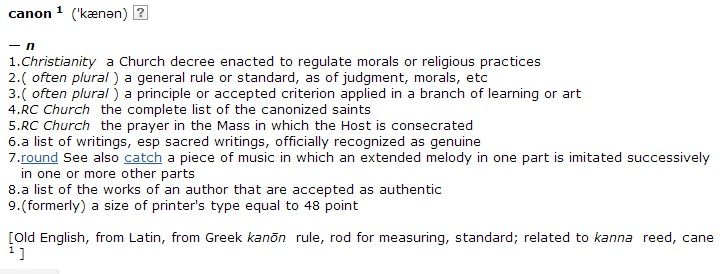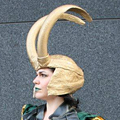Blowing Holes in Ships: The Many Kinds of Canon
Just to be clear, we’re talking about this:

Not this:

Which, despite their similarities and frequent use in the perpetuation of senseless violence, are two very different things.
In general, when fans talk about canon, they’re talking about any official content related to a particular universe or franchise. In some cases, that just means one book or film, but other canons can be a little more expansive. With the Marvel Cinematic Universes, for instance, the core canon is the films released by Marvel Entertainment that officially share the same continuity¹. Also included in the MCU canon, however, are the Agents of SHIELD tv series, tie-in comics, novelisations, one-shots, and creator commentary. This gets even more complicated when you start talking about Marvel comics canon, which is a giant ball of wibbly-wobbly all on its own, but we’re not going to go there.
The word ‘canon’, in fan-speak, can also refer to any events, details, or facts contained in the canonical texts. Like, it is canon that Phil Coulson is an agent of SHIELD; it is not canon that he once took down an entire Hydra base with a pen². Canon, if you will, provides both the foundation and raw materials with which we build the nightmare structures and pretty pink castles of fandom.
So, say you walked out of the last Captain America movie (no spoilers!) thinking, “I bet Natasha changes her hair every few months. Like, I think that’s a thing she does deliberately because it’s a way of asserting control over her identity.”
A week goes by, you see the movie two or three more times, and you think about how Natasha must have done a shitton of recon before picking out a salon, about how it’s probably this old fashioned hole-in-the-wall kind of place and how she must have a whole cover created just to go get her hair done. It’s not a super important detail or something that changes how you see the movie, just something you like to think about that helps fill out the character in your head.
In fan-speak, we call this headcanon, as in – you guessed it – canon that’s just in your own head. Now, say, the thing about Natasha’s hair is my headcanon, but you’re reading this and going, “Yeah! Yeah, that totally makes sense. I like that.” In that case, the appropriate response is HEADCANON ACCEPTED, typically communicated in all caps, as shown.
Sometimes, large portions of a fandom will collectively agree on a detail or idea that isn’t supported by official canon but seems to fit with the general understanding of the text. For instance, at no point anywhere in the MCU does Hawkeye crawl around in the SHIELD air conditioning ducts, but a quick search will find you scores of fics that feature or focus on Clint Barton’s dumb ass hanging out by a ceiling vent. When this happens – and it does, more often than you might think – the detail is considered fanon. Like, fan + canon, obviously.
Now, the really interesting thing about all of this is that, when it comes to fan fiction, what inevitably, invariably happens to any kind of canon is something like…

So what’s the point, right? Why spend all of this time and energy developing, cataloguing, and memorizing a million details if you know there’s going to come a day when you just say, “Fuck it”?
Well, for one thing, official creators throw shit out the window all the time. Like, everybody knows SHIELD, right? And everyone calls it SHIELD, even in the “Agent Carter” one-shot, which takes place before the organization even officially exists. However, according to Coulson in Iron Man, there is no acronym (“We’re working on it.”), and, in the tie-in comics, Director Fury is surprised to hear the shortened name³. Is that a totally reasonable retcon (retroactive continuity) to make in order to avoid the poor actors having to say “Strategic Homeland Intervention Enforcement Logistics Division” over and over? Absolutely. Still an inconsistency.
For another thing, it’s just not that important. Sure, it’s super distracting if a story can’t keep it’s details straight, but fan fiction – and any good story, really – is more concerned with character than consistency. For instance, we know that Falcon was a paratrooper before becoming a VA counselor and then hitching his wagon to Captain America, but what if I’m writing a pre-Cap 2 fic and realize that it would be made 1000% more awesome by the addition of Sam Wilson, Agent of SHIELD⁴? Do I scrap that idea just because it doesn’t quite mesh with Sam’s canon backstory? Fuck no! Dude can be a SHIELD agent in this story if I want him to be.
It’s also fairly common for unpopular or inconvenient chunks of canon to be dismissed entirely. One of the more notorious instances of this followed the release of the seventh Harry Potter book and it’s hotly debated epilogue⁵, which revealed the futures of several main characters after the end of the story. It was common to see fics tagged “Epilogue? What Epilogue?” (EWE) until recently, when Rowling herself said that she had changed her mind about most of the epilogue’s content. In MCU fan fiction, there’s a lot of “Not AoS-compliant”, usually indicating a dismissal of the explanation for Agent Coulson’s resurrection featured in Agents of SHIELD. Lately, we’ve been seeing some “Not TWS-compliant”, which means we’re going to pretend that The Winter Soldier didn’t happen until everything stops hurting⁶.
Sometimes, fan fiction deals with canon derivation more directly, in the form of “Fix-its” and Alternate Realities/Universes, but that’s a can of awesome to be opened another day.
Ultimately, official canon is like the rules of reality. Like, in the real world that we actually live in, it’s totally impossible to turn a ninety pound kid with asthma into six feet and two inches of badass supersoldier using a special serum and “vita-rays”, but we accept that premise in fiction without a second thought. In canon, maybe there’s absolutely no way for people to travel to an alternate dimension⁷, but a fic that opens with an alternate Coulson popping over through an interdimensional portal? I guarantee none of the readers will bat an eye, and it’s probably the least weird thing that will happen in that story.
What this means for fic writers is that the possibilities for reimagining are boundless. As a rule, we pick and choose the parts of canon (and fanon and our own headcanons) that work for every individual story we want to tell, and, the bigger the canon is, the more we have to choose from, the wider our foundation and the more materials we have to build with. Sometimes, what we build has a lot of the same stuff as the canon we’re building on, and, sometimes, we write stories where one character is lichen. Anything is fair game.
¹This is the Avengers films, for those who haven’t ventured out of their caves in a while.
²Reports are unconfirmed. There is supporting evidence, and similar incidents have been recorded.
³See Marvel’s Iron Man 2: Agents of SHIELD. Yes, I have read all the tie-in comics. Don’t judge me.
⁴Everything is made 1000% more awesome by the addition of any version of Sam Wilson.
⁵Friendships were ruined. Forums burned. The interwebs trembled.
⁶Hail Hydra.
⁷MCU canon. It’s totally possible in pretty much every other Marvel canon.



Adam
I hate to contradict anything here, because it was a fun read, but Coulson does tell Pepper to call the organization SHIELD in the first Iron Man. It’s at the very end before Tony’s press conference. Which really doesn’t matter, since these were just examples used to talk about canon, and not the MCU itself. I like pie.
Jo
Phil’s comment to Pepper happens *after* he uses the acronym in conversation with Fury (in the tie-in comic), who has apparently never heard it before but gives it his seal of approval. Before that, it’s implied that the name SHIELD was only used casually among agents, never officially. So, in terms of canonical timeline, the name Strategic Homeland etc. doesn’t officially get shortened to SHIELD until about 3/4 through the events of IM1, which coincides with the IM2 tie-in. If the name SHIELD was in strictly casual use prior to 2010 (roughly the date of IM1, based on the official MCU timeline), it’s doubtful that nickname would have existed in 1946(?), before the organization was even founded, which makes its use in the Agent Carter one-shot nonsensical and inconsistent with existing canon.
…I’m gonna go back to writing my fan fiction now.
Adam
I like french silk pie, pumpkin pie, pecan pie…any kind of pie really. This directly feeds into the discussion, which is great- the whole tie-in comics part of the canon thing, not the pie.
Beth
Your pie tag at the end gets you a +1 Adam.